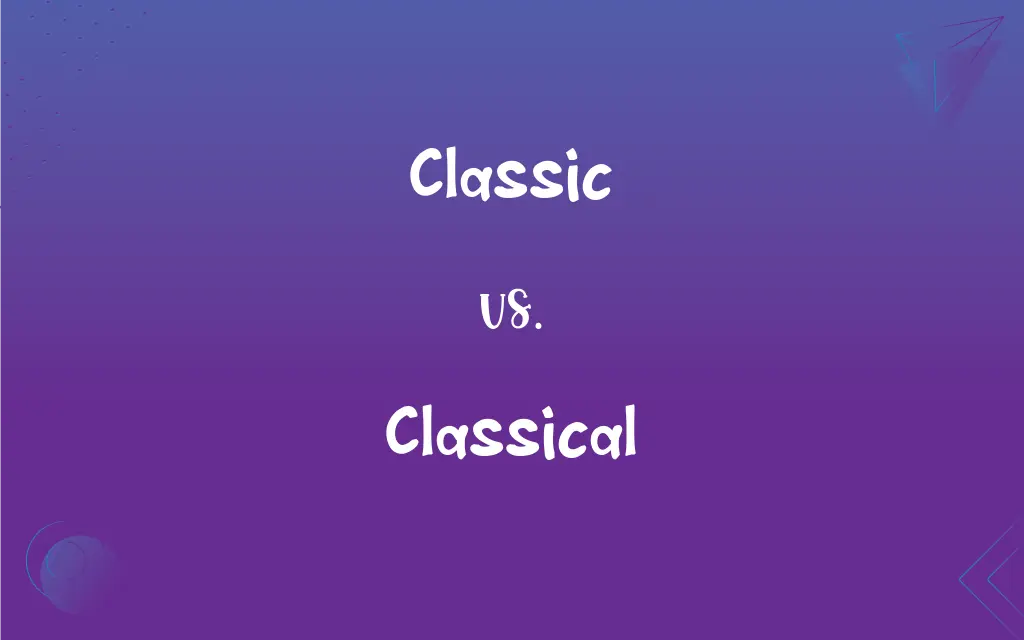Classic vs. Classical: What's the Difference?
Edited by Harlon Moss || By Janet White || Published on November 10, 2023
"Classic" refers to something of high quality and lasting value, while "Classical" pertains primarily to ancient Greek and Roman cultures or classical music.

Key Differences
"Classic" is an adjective that denotes something of recognized value and exemplary quality. A book, for instance, that's termed a "classic" has been acknowledged for its timeless quality and enduring significance. Whether it's literature, cars, or movies, "classic" suggests something that has withstood the test of time and remains impactful.
"Classical," on the other hand, is more specific in its reference. Often, it's associated with the arts, cultures, and historical periods of ancient Greece and Rome. Thus, when one speaks of "classical architecture," they're referring to styles reminiscent of ancient Greco-Roman designs. Similarly, "classical languages" encompass ancient tongues like Latin and ancient Greek.
Beyond ancient civilizations, "Classical" has a strong association with music. "Classical music" pertains to a genre of music, mainly encompassing compositions from the late 18th to early 19th centuries, marked by its intricate structures and formal styles. It's distinct from other genres like rock, jazz, or country.
However, "Classic" can also be used in musical contexts but with a different nuance. A "classic rock song," for instance, points to a track from the rock genre that's stood out over time due to its quality or influence. Therefore, while "Classical" in music strictly refers to a specific genre, "Classic" implies timeless quality across various genres.
While both terms can denote quality and timelessness, "Classic" is broader, encompassing a range of fields and denoting enduring value, whereas "Classical" is more specific, mostly related to ancient cultures or a music genre.
ADVERTISEMENT
Comparison Chart
Definition
Of high quality and lasting value
Pertaining to ancient Greek and Roman culture or a specific music genre
Example Usage
"Classic literature"
"Classical architecture"
Association with Music
Timeless quality across genres
Specific genre from 18th-19th centuries
Historical Context
General enduring value
Ancient Greece and Rome
Broadness of Application
Broader application
More specific in nature
ADVERTISEMENT
Classic and Classical Definitions
Classic
Traditional or typical
That joke is a classic example of dad humor.
Classical
Relating to ancient Greece and Rome
The pillars have a classical design.
Classic
Enduring and widely popular
A white shirt is a classic wardrobe staple.
Classical
Pertaining to European music from roughly 1750 to 1820
Beethoven's works are a part of classical music.
Classic
Belonging to the highest rank or class.
Classical
Revered as a model
The book is a classical study on human psychology.
Classic
Serving as the established model or standard
A classic example of colonial architecture.
Classical
Of or relating to the ancient Greeks and Romans, especially their art, architecture, and literature.
Classic
Having lasting significance or worth; enduring.
Classical
Conforming to the artistic and literary models of ancient Greece and Rome.
Classic
Adhering or conforming to established standards and principles
A classic piece of research.
Classical
Versed in the classics
A classical scholar.
Classic
Of a well-known type; typical
A classic mistake.
Classical
Of or relating to European music during the latter half of the 18th and the early 19th centuries.
Classic
Of or characteristic of the literature, art, and culture of ancient Greece and Rome; classical.
Classical
Of or relating to music in the educated European tradition, such as symphony and opera, as opposed to popular or folk music.
Classic
Formal, refined, and restrained in style.
Classical
Of, relating to, or being a variety of a language that is epitomized by a prestigious body of literature.
Classic
Simple and harmonious; elegant
The classic cut of a suit.
The classic lines of a clipper ship.
Classical
Standard and traditional
Classical methods of navigation.
Classic
Having historical or literary associations
Classic battlefields of the Civil War.
Classical
Relating to or being a school of thought or field of study that is established and widely accepted before others
Classical economics.
Classic
An artist, author, or work generally considered to be of the highest rank or excellence, especially one of enduring significance.
Classical
Of or relating to physics that can be described without the use of quantum mechanics or relativity.
Classic
A work recognized as definitive in its field.
Classical
Relating to or consisting of studies in the humanities and general sciences
A classical curriculum.
Classic
A literary work of ancient Greece or Rome.
Classical
Of or relating to the first class or rank, especially in literature or art.
Classic
Classics The languages and literature of ancient Greece and Rome. Used with the.
Classical
Of or pertaining to established principles in a discipline.
Classic
One that is of the highest rank or class
The car was a classic of automotive design.
Classical
(music) Describing Western music and musicians of the late 18th and early 19th centuries.
Classic
A typical or traditional example.
Classical
Describing art music (rather than pop, jazz, blues, etc), especially when played using instruments of the orchestra.
Classic
(Informal) A superior or unusual example of its kind
The reason he gave for being late was a classic.
Classical
Of or pertaining to the ancient Greeks and Romans, especially to Greek or Roman authors of the highest rank, or of the period when their best literature was produced; of or pertaining to places inhabited by the ancient Greeks and Romans, or rendered famous by their deeds.
Classic
A traditional event, especially a major sporting event that is held annually
A golf classic.
Classical
Knowledgeable or skilled in the classics; versed in the classics.
A classical scholar
Classic
Of or relating to the first class or rank, especially in literature or art.
Classical
Conforming to the best authority in literature and art; chaste; pure; refined
Classical dance.
Classic
Exemplary of a particular style; defining a class/category; typical.
Classical
(physics) Pertaining to models of physical laws that do not take quantum or relativistic effects into account; Newtonian or Maxwellian.
Classic
Exhibiting timeless quality and excellence.
"To Kill a Mockingbird" is a 1960 classic book by Harper Lee.
Classical
(countable) One that is classical in some way; for example, a classical economist.
Classic
Characteristic of or from the past; old; retro; vintage.
Watching classic movies as a hobby
Classical
(chess) classical chess
Classic
Of or pertaining to the ancient Greeks and Romans, especially to Greek or Roman authors of the highest rank, or of the period when their best literature was produced; of or pertaining to places inhabited by the ancient Greeks and Romans, or rendered famous by their deeds.
Classical
Of or characteristic of a form or system felt to be of first significance before modern times
Classic
Traditional; original.
Users who dislike the new visual layout can return to classic mode.
Classical
Of recognized authority or excellence;
The definitive work on Greece
Classical methods of navigation
Classic
A perfect and/or early example of a particular style.
Classical
Concerning the standard and traditional
Classical ballet techniques are rigorous.
Classic
An artistic work of lasting worth, such as a film or song; a work of enduring excellence.
Classical
Relating to the classical languages
She studied classical Latin during her college years.
Classic
The author of such a work.
Classic
A major, long-standing sporting event.
Classic
(horse racing) Any of the British Classic Races, five long-standing Group 1 horse races run during the traditional flat racing season.
Classic
(dated) One learned in the literature of Ancient Greece and Ancient Rome; a student of classical literature.
Classic
Of or relating to the first class or rank, especially in literature or art.
Give, as thy last memorial to the age,One classic drama, and reform the stage.
Mr. Greaves may justly be reckoned a classical author on this subject [Roman weights and coins].
Classic
Of or pertaining to the ancient Greeks and Romans, esp. to Greek or Roman authors of the highest rank, or of the period when their best literature was produced; of or pertaining to places inhabited by the ancient Greeks and Romans, or rendered famous by their deeds.
Though throned midst Latium's classic plains.
The epithet classical, as applied to ancient authors, is determined less by the purity of their style than by the period at which they wrote.
He [Atterbury] directed the classical studies of the undergraduates of his college.
Classic
Conforming to the best authority in literature and art; chaste; pure; refined; as, a classical style.
Classical, provincial, and national synods.
Classic
A work of acknowledged excellence and authority, or its author; - originally used of Greek and Latin works or authors, but now applied to authors and works of a like character in any language.
In is once raised him to the rank of a legitimate English classic.
Classic
One learned in the literature of Greece and Rome, or a student of classical literature.
Classic
A creation of the highest excellence
Classic
An artist who has created classic works
Classic
Characteristic of the classical artistic and literary traditions
Classic
Adhering to established standards and principles;
A classic proof
Classic
Recognized and valued over time
Pride and Prejudice is a classic novel.
Classic
Representing an exemplary standard
The car's design is a classic example of elegance.
Classic
Of the highest class or rank
The restaurant offers classic dining.
FAQs
Can modern items be termed "Classic"?
Yes, if they represent a standard or are of high quality.
Does "Classic" always refer to something old?
No, it denotes enduring quality, not necessarily age.
Does "Classical" mean sophisticated?
It denotes specific styles, especially from ancient cultures or in music, but is often seen as sophisticated.
Can "Classic" be used for movies?
Yes, like "a classic film."
Can "Classical" refer to literature?
It can, especially if relating to ancient Greek and Roman works.
Is "Classical" primarily associated with music?
While common in music, it also refers to ancient Greek and Roman cultures.
Does "Classical" always denote something old?
Typically, especially in relation to ancient cultures or traditional music.
Can a car be termed "Classic"?
Yes, if it's of high quality, traditional design, or has enduring value.
Can a joke be termed "Classic"?
Yes, if it represents a traditional or enduring humor.
Can fashion have "Classic" elements?
Yes, signifying enduring or traditional styles.
Is "Classical" always serious in tone?
Often, due to its association with tradition and formality.
Is "Classic" broader in application than "Classical"?
Yes, "Classic" has a broader range, while "Classical" is more specific.
Are both terms commonly used in arts and culture?
Yes, they both have significant roles in denoting quality, style, and tradition in various fields.
Is "Classical" music from the 20th century?
It primarily refers to compositions from the late 18th to early 19th centuries.
Can "Classic" denote a sense of style?
Yes, like "classic elegance."
Can "Classical" be about language?
Yes, like classical Latin or Greek.
Does "Classical" refer to a certain period in history?
Often, especially ancient Greece and Rome.
Is "Classical" used in architecture?
Yes, particularly designs inspired by ancient cultures.
Which word is more versatile in application?
"Classic" due to its broader implications.
Can "Classic" imply a high rank?
Yes, indicating top-tier quality or status.
About Author
Written by
Janet WhiteJanet White has been an esteemed writer and blogger for Difference Wiki. Holding a Master's degree in Science and Medical Journalism from the prestigious Boston University, she has consistently demonstrated her expertise and passion for her field. When she's not immersed in her work, Janet relishes her time exercising, delving into a good book, and cherishing moments with friends and family.
Edited by
Harlon MossHarlon is a seasoned quality moderator and accomplished content writer for Difference Wiki. An alumnus of the prestigious University of California, he earned his degree in Computer Science. Leveraging his academic background, Harlon brings a meticulous and informed perspective to his work, ensuring content accuracy and excellence.







































































